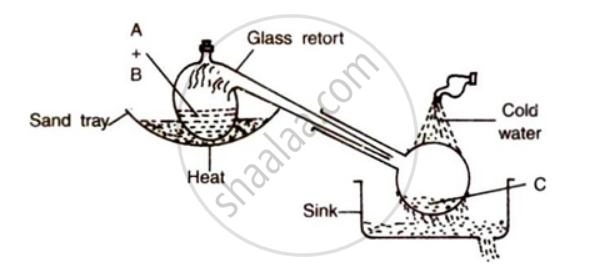Advertisements
Advertisements
प्रश्न
The nitrate salt which does not give a mixture of \[\ce{NO2}\] and \[\ce{O2}\] on heating is ______.
पर्याय
AgNO3
KNO3
Cu(NO3)2
Zn(NO3)2
उत्तर
The nitrate salt which does not give a mixture of NO2 and O2 on heating is AgNO3.
APPEARS IN
संबंधित प्रश्न
Write a balanced chemical equation for the following:
Action of cold and dilute Nitric acid on Copper
Write balanced chemical equations for Action of hot and concentrated Nitric acid on copper
Ammonia is used in the Ostwald process.
What is the ratio of ammonia and air taken in this process?
Mention three important uses of nitric acid. Give the property of nitric acid involved in the use.
Give reason for the following:
Nitric acid is used in purification of gold.
What do you observe when?
Conc. HNO3 drops on the skin of a person?
Choose the correct answer from the option given below :
Nitric acid on standing develops brownish colour which may be attributed to the presence of :
The figure given below illustrates the apparatus used in the laboratory preparation of nitric acid:
(i) Name A (a liquid), B( a Solid) and C(a liquid).
(ii) write the balanced chemical equation to show how nitric acid undergoes decomposition.
(iii) Write the balanced chemical equation for the reaction in which copper is oxidized by concentrated nitric acid.
X, Y, and Z are three crystalline solids that are soluble in water and have common anion.
To help you to identify X, Y and Z, you are provided with the following experimental observations. Copy and complete the corresponding inferences in (a) to (e).
- A reddish-brown gas is obtained when X, Y, and Z are separately warmed with concentrated sulphuric acid and copper turning added to the mixture.
INFERENCE 1: The common anion is the ______ ion. - When X is heated, it melts and gives off only one gas which re-lights a glowing splint.
INFERENCE 2: The cation in X is either ______ or ______. - The action of heat on Y produces a reddish-brown gas and yellow residue which fuses with a glass of the test tube.
INFERENCE 3: The metal ion present in Y is the ______ ion. - When Z is heated, it leaves no residue. Warming Z with sodium hydroxide solution liberates a gas which turns moist red litmus paper blue.
INFERENCE 4: Z contains the ______ cation. - Write the equations for the following reactions:
- X and concentrated sulphuric acid (below 200°C). (One equation only for either of the cations given in INFERENCE 2)
- The action of heat on Y.
- Concentrated nitric acid is added to copper turnings kept in a beaker.
A dilute acid B does not normally give hydrogen when reacted with metals but does give a gas when reacts with copper. Identify B. Write the equation with copper.
